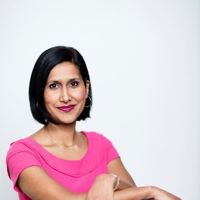This Critical Conversation, chaired by Academy CEO Dr Hayaatun Sillem CBE, explored governance structures for complex systems and existing regulation gaps using the offshore wind sector as a case study. Discussions will focus on how governance can support recyclability, regional collaboration, and adaptability.
Critical Conversations
Bringing together the thoughts of leading experts from across the Academy’s networks, our Critical Conversations explore issues of relevance to global professional engineering community and wider society. Fellows, awardees, and engineering partners gather to tackle topical issues of relevance to the global professional engineering community and wider society.

Dr Hayaatun Sillem CBE
Hayaatun is CEO of the Royal Academy of Engineering and Queen Elizabeth Prize for Engineering Foundation. She co-chairs with the Science Minister the government’s Business Innovation Forum and co-chaired with Sir Lewis Hamilton his Commission on improving Black representation in motorsport. She is a trustee of various charities, member of the government’s Levelling Up Advisory Council and Digital Skills Council and NXD at construction company Laing O’Rourke. She has been named as one of the ‘Inspiring 50’ women in tech in Europe and one of the most influential women in both UK engineering and UK tech. She has a Masters in Biochemistry (MBiochem) from Oxford and a PhD from Cancer Research UK/UCL. She is a Fellow of the IET, Honorary Professor at UCL and Honorary Fellow at The Queen’s College, Oxford. She has received honorary doctorates from UCL, Imperial College London, Newcastle, Brunel, Huddersfield and Southampton, as well as a Science Suffrage Award and the Engineering Professor’s Council President’s Medal. She was a finalist for the Veuve Clicquot Bold Woman Award and was made a CBE for services to International Engineering in 2019. Prior to her current roles, she was Deputy CEO at the Academy and served as Committee Specialist and later Specialist Adviser to the House of Commons Science & Technology Committee.

Professor Deborah Greaves OBE FREng

Dr Louis Klein

Hanh Nguyen
Conquering complexity through systems approaches
This three-part series will explore systems approaches to complex challenges, focusing on understanding systems, enhancing capacity building, and improving governance structures. Through these sessions, the audience will gain a better understanding of systems approaches and the long-term benefits of investing in them to tackle complex challenges.
- The first event will break down what complex challenges are and start showing how an engineering mindset- systems approaches- can benefit us when tackling them.
- The second event will apply a systems approach to capacity building, drawing on case studies from the Global Engineering Capability Review 2 and Engineers for Africa report.
- The third event will look at governance of complex systems, discussing what effective governance of complex systems looks like, and using the offshore wind sector as an example.
